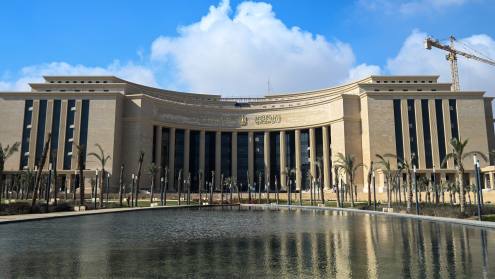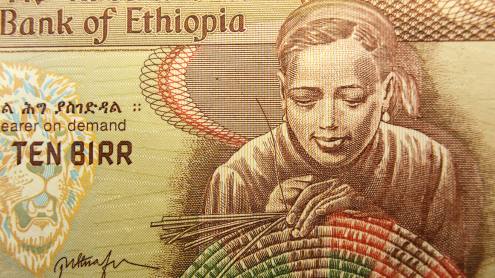A year into its most serious economic crisis since 2016, Egypt once again faces a moment of reckoning, as the prerogative for serious structural reform becomes ever more urgent.
The collapse in the country’s foreign exchange reserves following Russia’s invasion of Ukraine has had a devastating impact on Egypt’s hitherto rapidly expanding but fragile economy. While recording stellar top-level gross domestic product (GDP) growth, such gains were achieved mostly via gas exports and government expenditure, with the government increasingly reliant on inflows from portfolio investors lured by attractively priced short-term debt.
The rapid exit of such funds has resulted in a currency depreciation of 50% since March 2022, with headline inflation surging to 31.9% in February and set to reach an all-time high in the coming months. Foreign currency shortages have also significantly impacted foreign imports to a country heavily reliant on imports of food and other goods, with $9.5bn worth of goods stuck in local ports as of end-December.
The agreement of a $3bn loan from the International Monetary Fund (IMF) in December, together with billions’ worth of grants and investment commitments from the Arabian Gulf, has bought some breathing space for the government. The import backlog appears to have eased in the early months of the year, with hopes that lower global commodity prices may see inflation start to fall later in the year.
Yet, with memories of a similar crisis in 2016 fresh in the memory, calls are growing for meaningful reforms to tackle the economy’s structural issues — especially among international portfolio investors and the country’s supporters in the Gulf.
“After the previous crisis in 2016, portfolio flows helped maintain stability in the foreign exchange market, meaning there was less urgency to attract foreign direct investment,” says Mohamed Abdel Kader, country head for Citi in Egypt.
“This time investors are going to want to see the foreign exchange market flexibility stabilising and generating enough liquidity before coming back in.”
Meaningful changes
Amid falling foreign direct investment inflows and a limited recovery in tourism receipts — responsible for around a quarter of exports in 2019 — following the onset of the Covid-19 pandemic, Egypt had become heavily reliant on external borrowing. By early 2022, debt represented 92% of GDP.
With foreign-held treasury bills accounting for about 70% of total foreign exchange reserves in late 2021, the country was left vulnerable to sudden shifts in emerging market sentiment.
And then Russia invaded Ukraine in February 2022, leaving Egypt — the largest importer of grain from the suddenly warring countries — in a uniquely precarious position among the world’s developing economies. Portfolio investors took fright, withdrawing more than $20bn from the country in the following months.
Faced with such rapid outflows, the Central Bank of Egypt (CBE) had little choice but to raise interest rates and let the Egyptian pound weaken by 14% in March 2022, in a bid to attract hard currency, the first such devaluation since 2016 (see graph).
The pound has been further weakened since, with the government agreeing to adopt a more market-driven approach to the currency in its discussion with the IMF. At time of writing, the exchange rate (US dollar to Egyptian pound) stood at 30.9, compared with 15.7 a year earlier.
While moves to an increasingly flexible exchange rate have been welcomed, the pound continues to weaken in black market trading, with futures contracts against the dollar falling to E£38 ($1.23) in early March, anticipating further devaluations.
“In terms of the real effective exchange rate, the pound looks undervalued — but only slightly,” says Gergely Ürmössy, an emerging market strategist with Société Générale.
“However, we expect a further devaluation as there’s still a very high demand for hard currency given that the country’s current account remains in sizeable deficit.”
Economic impact
A weaker pound and higher commodity prices have had a devastating impact on Egypt’s 105 million strong population. Having exceeded the CBE’s target range of 5–9% since March 2022, annual inflation surged to 31.9% in February, with food prices having risen 62% over the past year.
Such increases have made everyday food items increasingly unaffordable for middle-class Egyptians, let alone those on lower incomes. The World Bank estimates that 60% of the population are now classed as poor or vulnerable.
After commodities spiked in the immediate aftermath of Russia’s invasion of Ukraine a year ago, lower prices may ease pressure on prices by the end of 2023.
“Wheat prices are coming down globally, which should in time offset the impact of the falls in the exchange rate,” says James Swanston, a Middle East and north Africa economist at Capital Economics. Nevertheless, he expects inflation to hit an all-time high of more than 35% for March, with falls to single-digit increases highly unlikely before mid-2024.
The $3bn IMF loan, agreed in October and subsequently approved by the fund’s executive committee in December, is Egypt’s fourth since 2016. The country is the IMF’s largest debtor behind Argentina.
In addition to a shift to a durable flexible exchange-rate regime and moves to tackle inflation, the programme agreed with the IMF envisages fiscal consolidation to reduce the country’s public debt burden, together with “wide-ranging structural reforms to reduce the state footprint and strengthen governance and transparency”.
As part of fiscal consolidation moves, the government in early March announced a 10% rise in the price of petrol, even as the price of diesel has remained unchanged since July 2022.
The government has also announced a list of dozens of national firms to be privatised and has also pledged to end favourable tax arrangements for the ever-increasing number of companies run by the country’s armed forces.
Beyond a fresh injection of funds from the IMF, governments in the Arabian Gulf, led by Saudi Arabia and the UAE, have come forward with aid packages worth around $22bn for the country in the past 12 months. Gulf sovereign wealth funds and state-affiliated companies are set to be some of the main beneficiaries of the country’s privatisation drive.
there’s growing dissatisfaction with how the money given in the past has been spent
Such pledges of assistance and investment are increasingly coming with conditions attached, however. Speaking at the World Economic Forum in Davos in January, Saudi Arabia’s finance minister Mohammed Al-Jadaan said that the country was changing how it worked with multilateral institutions “to actually say we want to see reforms”, as opposed to its previous giving approach that came without strings attached.
“Criticism is growing from the Gulf Co-operation Council about the Egyptian government having to continually return to them for money without undertaking necessary reforms, and there’s also growing dissatisfaction with how the money given in the past has been spent,” says Timothy Kaldas, deputy director of the Tahrir Institute for Middle East Policy in Washington DC.
And while Egypt remains an attractive destination for portfolio investors in the long-term, any return of hot money is likely to be more limited in the shorter term, given the global economic climate.
“Compared with the situation after 2016 there is much higher inflation globally, which has prompted central banks to raise interest rates, meaning money is not free anymore,” says Société Générale’s Mr Ürmössy.
“Therefore, there’s a greater reluctance for portfolio flows to enter emerging markets and especially frontier markets like Egypt in the short term.”













